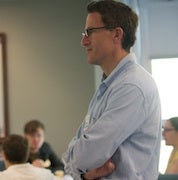
Trekking through the woods to learn about forest ecology, hopping aboard a fisheries research trawler, and studying eroding shore lines is what comes to mind when Providence Journal reporter Richard Salit reflects on his Metcalf experience. As a 2004 fellow in the Science Immersion Workshop for Journalists, Salit says he was introduced to some of the most important environmental issues confronting the coast.
“Not through dry classroom lessons, but by getting outdoors where the issues felt real,” said Salit. “Probably the greatest, lasting lesson learned from the workshop was that as journalists, we need to strive to go beyond the notion of just reporting on two sides of an issue, and to broaden our information-gathering to include what scientists know about the subjects we are writing about.”
Salit was a general assignment reporter covering the city of Newport at the time of his fellowship and wanted to gain a better understanding of the science needed to pursue environment-related stories. As a fellow, Salit found it especially helpful to talk to scientists who could explain environmental issues with authority. He was also inspired by the caliber of reporters participating in the workshop.
Now he’s a full-time environment reporter for the Providence Journal covering a “vital and rich beat” for the newspaper. “In my first year on the beat, I was pleased to have the opportunity to write an extended series on how property owners and government regulators are responding to the damage Hurricane Sandy wreaked along Rhode Island’s coastline,” he added.
Salit has also taken on another title, Metcalf Institute’s journalism co-director. He was appointed to the voluntary position in 2012 after his former colleague, Peter Lord, died of brain cancer.
“The Institute has matured and become so successful, and Peter Lord was such a driving force in making it happen, that I knew I had large shoes to fill,” said Salit. “But I wanted to do everything I could to continue his legacy and to ensure that Metcalf continues to offer invaluable training for journalists striving to improve their reporting on science and the environment. I benefited greatly as a fellow and want to see others enjoy the same experience.”
Read More Alumni Profiles